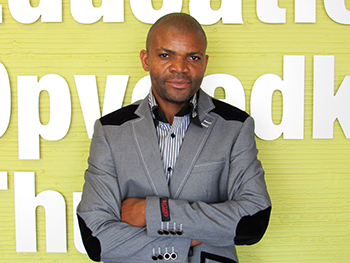Latest News Archive
Please select Category, Year, and then Month to display items
12 January 2024
|
Story Nonsindiswe Qwabe
|
Photo Sonia Small
 Since joining the UFS in 2008, Dr Grey Magaiza has worked extensively on approaches that can foster the socio-economic transformation of societies.
Since joining the UFS in 2008, Dr Grey Magaiza has worked extensively on approaches that can foster the socio-economic transformation of societies.
“The future should be one where communities can decide on their development agenda and futures. That’s the most important for me.” Dr Grey Magaiza, Deputy Director of the Centre for Gender and Africa Studies (CGAS) and Head of the Community Development programme on the Qwaqwa Campus, is passionate about capacitating communities to be agents of change and advancement. His vision for the future emphasises the empowerment of communities to take charge of their development by actively participating in decision making and the implementation of development projects that can improve their lives.
Since joining the UFS in 2008, Dr Magaiza has worked extensively on approaches that can foster the socio-economic transformation of societies. Over the years, he has crafted his research speciality into one that he is most proud of – being an interdisciplinary scientist immersed in the development of communities.
“I’m in a fortunate position of researching what I like. I say ‘fortunate’, because I’ve taken the time to understand what I’m passionate about, which is the overall field of rural livelihoods and livelihood futures – in short, community development. My research starts from an engaged university, understanding the elements that a university must use to enhance transformation and relevance to its immediate community in terms of development.”
One of the ways he has done this is by looking at social entrepreneurship as a development approach for young people in a rural setting. Through workshops with non-profit and civic organisations in Qwaqwa, Dr Magaiza has been helping these organisations to map out their needs and actively meet them through the involvement and support of external role players.
“We understand that communities are part of the national development agenda, but even that national agenda respects community knowledge and intentions and allows communities to shape their identity. A critical enabler of this is community organising. You bring back the capacity in communities to have dialogues on issues affecting them as spaces for engagement, knowledge exchange, and for people to just talk about their way forward.”
By enabling communities to define their development agenda, they can address their specific needs, challenges, and aspirations, he said. “When I look at livelihood futures, it’s quite an exciting aspect of my work – it’s like looking into a fortune tellers’ globe, because you’re not deciding for communities what they should do, but the communities themselves take those decisions.”
UFS PhD scholar honoured by Free State MEC of Education
2016-12-12

Thabo Sithole was awarded a National Teaching Award
for excellence in teaching Physical Sciences.
Photo: Aneka van der Merwe
Thabo Sithole, a PhD student at the University of the Free State’s (UFS) Faculty of Education, was recently awarded a prestigious award during the provincial National Teaching Awards in November at which he was celebrated along with other teachers from the Free State.
Sithole was awarded for excellence in teaching Physical Sciences, using a variety of strategies to appeal to the different abilities of learners.
He holds a BSc Medical Microbiology, BSc Chemistry, BCom Economics, BSc Hons in Chemistry, BCom Hons in Economics and MA in Mathematics. To qualify to become an educator, he completed his Postgraduate Certificate in Education (PGCE) at UFS.
Apart from teaching, Sithole assists youths confronted with substance abuse and was instrumental in getting funding to assist young people in Jacobsdal. The Albertina Sisulu Youth Recreation Centre in the town now receives annual funding from the Free State Department of Social Development.
Through the National Teaching Awards, the Department of Basic Education acknowledges the extraordinary efforts of teachers, often achieved under very difficult conditions and in service to children from underprivileged families and economically depressed communities.
Leadership is a crucial element to all schools functioning at optimum with all teachers, learners and parents moving forward with a common vision for the improvement of the school.
Sithole’s work also focuses on clustering childhood development centres to work together in order to enhance the preparedness of learners entering primary school. The MEC for Education, Mr Tate Makgoe, said the National Teaching Awards recognised and promoted excellence in teaching.
The UFS Faculty of Education congratulated all teachers in South Africa who worked tirelessly to build a better future for all learners.